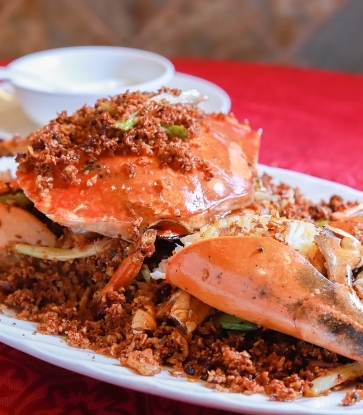In partnership with SJM Resorts, S.A. ("SJM"), the 15th edition of the MICHELIN Guide Hong Kong & Macau was launched last April 2023 at Grand Lisboa Macau, followed by the MICHELIN Guide Ceremony Gala Dinner at Grand Lisboa Palace Resort Macau ("Grand Lisboa Palace"). This was the first time the gala dinner was held at the property.
The ceremony brought together a star-studded roster of seven MICHELIN-star restaurant chefs presenting an unforgettable eight-course dinner. Each dish was inspired by the chefs' experiences in Hong Kong and Macau, paying homage to their fondest memories of the cities. In his own personal tribute to Hong Kong and Macau, executive chef Albert Au Kwok Keung of three-MICHELIN-star The 8 prepared a Pan-Fried Spotted Garoupa Fillet in Supreme Broth for the fourth course.
To prepare this dish, local and sustainably sourced garoupa is first fried and then braised and paired with a golden soup made from fish bones and crab to bring out the umami and fresh flavours of the fish. “I wanted to present a light and refreshing dish in the middle of dinner to allow some breathing space and for everyone to refresh their palates,” explains Au. “It’s easy to make dishes with strong flavours, but being able to highlight the purity of the ingredients themselves is equally important. I hope that guests will be able to appreciate the original and unadulterated flavour of the spotted garoupa through this dish.”
The simplicity and elegance of the dish reflect the tremendous amount of thought and culinary consideration put into it.

In his dish, Au (Photo: SJM) has chosen to highlight the local and sustainably sourced spotted garoupa with a golden-hued soup made from water crab, a famed produce of Doumen, Zhuhai. It is also a nod to Macau's traditional local delicacy of water crab porridge. The laborious process of making the golden soup requires fish bones and crab to be boiled separately before they are blended together. Au explains that this is because of the different temperatures and cooking times required to extract the best flavours from each component — crab breaks down faster, while fish bones take longer to release their flavour. Blending them together after boiling integrates the flavours better.
The cooking techniques are also carefully considered. As the star ingredient, the garoupa is first fried then braised, introducing new layers of taste and texture with each cooking method.
“Of course, fried fish is common in Cantonese cuisine," he says. "Sprinkle some salt to season simply, and you can cook a delicious dish. But I wanted to ensure that the garoupa was going to taste consistent for all 500 guests, so I chose not to fry the fish and instead use a method called 'ban jian zhu' (a technique of pan-frying and then simmering) to control the temperature and preserve the umami-ness of the fish.”
While fried fish is crispy and delicious, frying causes the flesh to dry out quickly. Though crispiness is lost by pan-frying the fish first before it is braised, the flavour and moisture are deliciously sealed in.
The Key to a Successful Dish: Temperature
For Au, the key to a successful dish on the day of the dinner was careful time management, because the most important thing in Cantonese cuisine is serving the dish at the perfect temperature.

The goal set for his team when serving the dish to 500 guests? Ten minutes from the time the fish is slaughtered until the dish is served. This was to ensure that the fish is savoured at its prime temperature. “A difference as slight as ten seconds would mean a temperature drop of a few degrees,” Au explains.
On the day of the gala dinner, Au started cooking the soup at noon — not too early, lest the soup become overcooked and lose its delicate umami flavour. The team started frying as the third course came to a close; then, 30 staff members worked up the tempo to present the dish to the guests in perfect timing.
Over the course of his 30-year-long culinary career, Au has hosted banquets large and small, from intimate state dinners to feasts for 20,000. And yet, the chef confesses that the mood felt different for this occasion. Before the dinner, he even staged several rehearsals with the team to make sure everyone was proficient and knew their roles by heart.
"The word 'Michelin' holds special meaning for me because, when The 8 received three MICHELIN stars, that was a huge turning point in my career," Au says. "I ran many rehearsals in preparation for the dinner, anticipating every step in the process so there would be no mistakes at all. After serving the dish to 500 guests that night, my team and I were very excited, but also a little nervous. Since most of the guests were industry professionals, we hope we succeeded in giving everyone an elevated gourmet experience, while we also hope to hear their comments on the dish so that we can make it better and better in the future."
This article was translated by Rachel Tan. Read the original article here.












